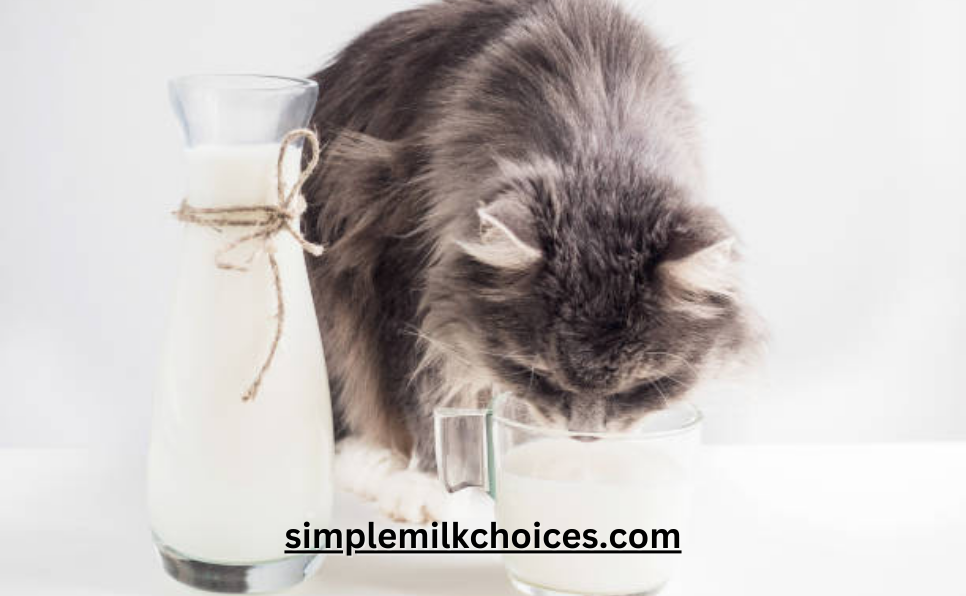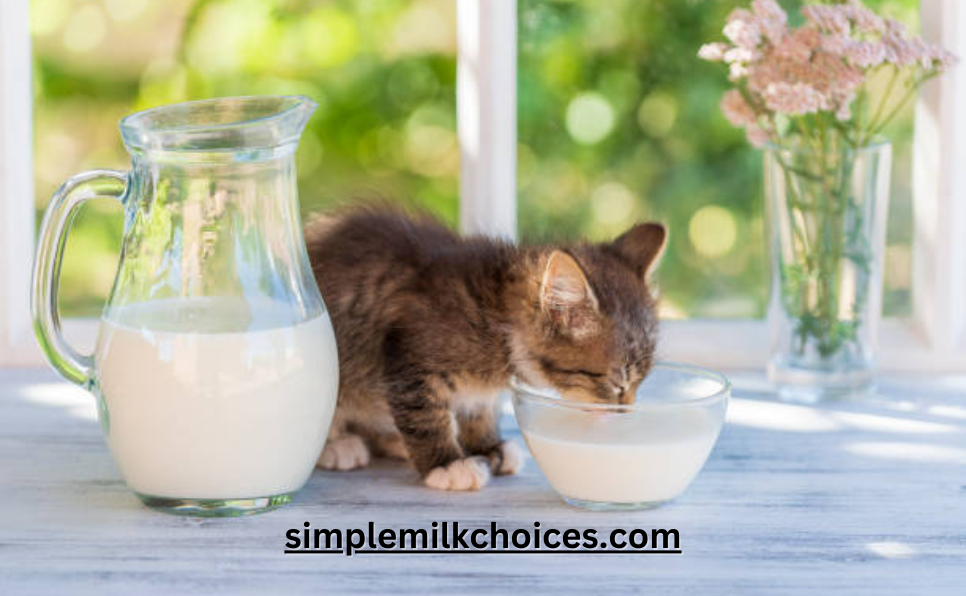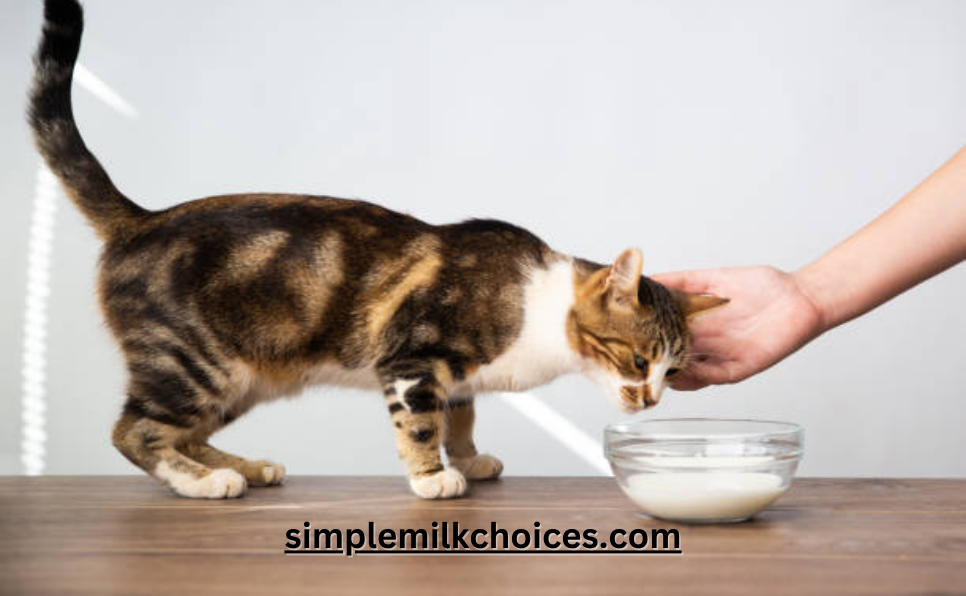Oat milk, the dairy-free sensation sweeping the culinary world, is a topic that’s captured the curiosity of pet owners. This article embarks on an exploratory journey, addressing a query that continues to intrigue many: “Can cats have oat milk?” We’ll look at the importance of this subject, the rise in oat milk consumption among humans, and the intricacies of cat diets.
Oat milk has gained popularity in recent years, becoming a household staple in many households. A variety of variables, including human dietary preferences and many more, contribute to its popularity. Mix soaked oats with water, filter out solid particles, and create a creamy and lactose-free milk substitute with this plant-based milk substitute. Many companies often supplement oat milk, a flexible dairy replacement, with key vitamins and minerals.
What is Oat Milk?
To answer the pivotal question of whether cats can have oat milk, we first need to gain a comprehensive understanding of what oat milk entails.
Oat Milk Production
Oat milk, at its core, is a product of simplicity. The process begins by soaking whole oats and then blending them with water. Afterward, it strains the mixture, separating the liquid from the solid oat particles. The result is a smooth, milky substance that can be consumed as-is or used in various culinary applications. In order to cater to diverse dietary requirements, oat milk often enriches itself with essential vitamins and minerals, such as vitamin D and calcium.
Nutritional Content and Benefits
One of oat milk’s prime attractions is its remarkable nutritional profile, which boasts a range of vitamins, minerals, and dietary fiber. Notably, oat milk contains no lactose, making it an appealing option for individuals with lactose intolerance, a common condition in the human population.
Oat milk is celebrated for being:
Low in Saturated Fat
It is naturally low in saturated fat, which is important for individuals trying to cut back on saturated fat.
Rich in Vitamins and Minerals
Oat milk can be fortified with vitamins such as vitamin D and minerals such as calcium, making it a valuable source of critical nutrients.
Dietary Fiber
Oats are naturally high in dietary fiber, which can help with digestion and give you a feeling of fullness.
Can Cats have Oat Milk?
Cats can technically consume oat milk in small quantities, but it’s not an ideal choice for their diet. Oat milk is a plant-based milk substitute made from oats, and while it may be safe for occasional consumption, it’s not a suitable replacement for a cat’s primary food and water sources.

The Natural Diet of Cats
Understanding the dietary demands of cats is critical when thinking about any prospective dietary adjustments. Cats are obligate meat eaters, which means they have evolved to thrive on a diet mostly made of animal protein. Key points regarding their natural diet include:
Carnivorous Nature
Over centuries, cats have adapted to become obligate carnivores, meaning they have biologically designed themselves to derive their essential nutrients from animal-based proteins. Their systems have evolved to depend on a diet rich in meat. Because certain nutrients are largely found in animal tissues, this dietary requirement is critical.
Taurine, a type of amino acid that cats cannot manufacture in enough amounts on their own, is one such important nutrient. Taurine plays a crucial role in various biological processes, such as promoting heart health and supporting vision. As a result, a taurine-deficient diet can cause serious health problems in cats.
Limited Plant Consumption
Cats have limited capacity to digest and absorb nutrients from plant-based meals. Cats, with their limited enzymatic activity and specific nutritional requirements best fulfilled by animal proteins, possess digestive systems specifically designed to break down and convert meat, unlike humans, who can extract a variety of nutrients from plant sources.
Oat Milk and Cats
Now, let’s delve into the heart of the matter—can cats safely consume oat milk? This section explores the potential implications and health considerations:
Lactose Intolerance in Cats
Many people think oat milk, which is naturally lactose-free, is a good alternative for cats. The majority of adult cats are lactose intolerant, which means they lack the enzymes required to digest lactose, a sugar present in dairy products. Oat milk looks like a logical choice because it contains no lactose.
However, keep in mind that, while oat milk is lactose-free, it is not always the best dietary complement for cats. Oat milk is still a plant-based product, and cats’ digestive systems are inherently designed for meat. Feeding them a non-meat product like oat milk can lead to digestive upset or discomfort, much like lactose intolerance symptoms in humans.
Allergies and Sensitivities
Cats, like people, can acquire food allergies or sensitivities. Oat milk is generally considered hypoallergenic, which means that it is unlikely to cause allergic responses in most people. However, keep in mind that each cat is unique, and individual sensitivities to oat milk or any other non-standard dietary item may differ. Allergies, although uncommon, can cause skin irritation, stomach problems, and respiratory difficulty.
Potential Benefits for Cats
While there are risks associated with introducing oat milk to a cat’s diet, there are potential benefits to consider as well.
Hydration
Cats frequently struggle to drink enough water, which can contribute to urinary tract problems. In some circumstances, providing oat milk in moderation may encourage cats to drink more fluids, improving their overall hydration.
However, it is critical to note that these possible benefits must be balanced against the risks and dietary requirements of a cat. A well-balanced, meat-based diet is still the foundation of the cat diet.

The Role of Veterinary Consultation
Before embarking on any significant dietary changes for your feline companion, consulting with a veterinarian is imperative.
Professional Guidance
Veterinarians are the most knowledgeable about cat nutrition. They may provide specialized guidance on food choices and adjustments, assuring your loved pet’s health and well-being.
Health and Safety
Professional guidance safeguards your cat’s health and safety. Veterinarians can evaluate your cat’s particular needs as well as potential food sensitivities, providing you with an in-depth understanding of the best dietary options for your pet.
Also Read: Is Skim Milk Vegan?
Alternatives to Oat Milk
Given that oat milk may not be the ideal option for cats, it’s critical to look into other options to ensure that your cat has a healthy and balanced diet. Consider the following cat-friendly meals and supplements:
Cat-Friendly Treats
Meat-Based Treats
Cats enjoy meat, so meat-based snacks are an easy way to satisfy them. Look for high-quality, protein-rich treats made especially for cats. These can serve as occasional rewards or training incentives.
Freeze-Dried Treats
Freeze-dried treats maintain the flavor and nutritional value of the original meat source. They come in various options, such as chicken, turkey, and fish, making them irresistible to cats.
Catnip
Many cats are drawn to the stimulating effects of catnip. Catnip-infused treats or toys can provide both mental and physical enrichment for your pet.
Supplements
Fish Oil
Omega-3 fatty acids found in fish oil can be beneficial for cats. These supplements can help your pet’s skin, coat, and overall health. Before adding any supplements to your cat’s diet, always consult your veterinarian.
Probiotics
Probiotics can help maintain a healthy gut microbiome for your cat. They are particularly useful if your cat has experienced digestive issues.
Multivitamins
Some cats may benefit from a daily multivitamin to ensure they receive all necessary nutrients, especially if they have dietary restrictions.

Conclusion
In conclusion, the question of whether cats can have oat milk is met with several considerations. While oat milk is popular for its nutritional value and lactose-free features, it may not meet the dietary requirements of cats. Because of their obligate carnivore character and the possibility of lactose intolerance, any new food introduced into their diet must be carefully considered.
To prioritize your cat’s health, always seek professional guidance from a veterinarian before making significant dietary changes. Veterinary advice ensures that your cat’s unique needs and sensitivities are taken into account.
We invite our valued readers to contribute their thoughts, experiences, and questions in the comments box below. Your suggestions and questions are essential for the development of a friendly and informed community. Your participation enables us to better answer your needs and interests in the field of non-dairy milk suggestions.
Don’t forget to subscribe to Simple Milk Choices for more informative and milk-related stuff.





